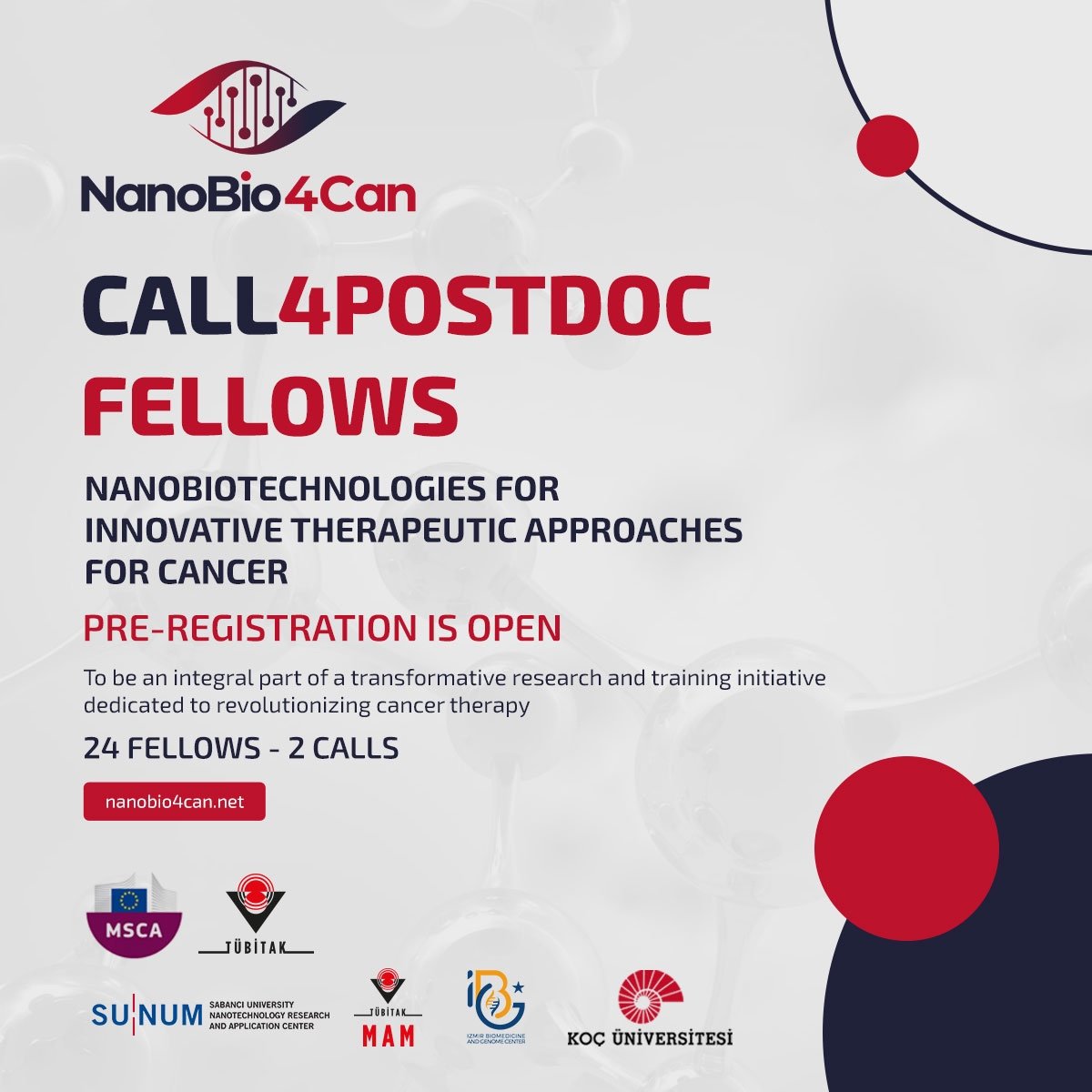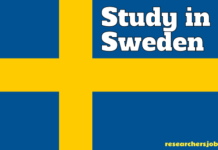NanoBio4Can Postdoctoral Fellowship Programme: NanoBio4Can is a Marie Skłodowska-Curie COFUND Programme (Horizon Europe Grant Agreement No. 101126492), offering 24 postdoctoral fellowships in the field of “Nanobiotechnologies for Innovative Therapeutic Approaches for Cancer.” Led by Sabanci University Nanotechnology Research and Application Center (SUNUM), in collaboration with TUBITAK Marmara Research Center, Koc University Research Center for Translational Medicine, and Izmir Biomedicine and Genome Center, this collaborative research and training program aims to advance cancer therapeutics through nanobiotechnologies.
- 🌐 Introduction
- The NanoBio4Can program, funded by the EU’s Horizon Europe and TUBITAK, aims to revolutionize cancer therapy through nanobiotechnologies.
- Led by Sabanci University, it collaborates with three Turkish research centers.
- The program focuses on interdisciplinary research and offers industry involvement through secondments.
- 📅 Timeline
- The timeline outlines various stages, including eligibility criteria, application procedures, and evaluation processes.
- 📝 Eligibility Criteria
- Experienced Researchers must have a doctoral degree or four years of research experience.
- Mobility Rule requires applicants not to have resided or worked in the recruiting country for more than 12 months in the last 36 months.
- 📄 Application Procedure
- Steps include identifying research areas, pre-registration, confirming supervisors, and potential secondment organizations.
- 📬 How to Apply
- Details proposal eligibility criteria and required application documents.
- 🌐 Evaluation and Selection
- Evaluation criteria for the program and research proposals are outlined in phases, including eligibility check, merit evaluation, interviews, and final scoring.
- 💼 Employment Conditions
- Describes conditions for fellows participating in the program.
- 💰 Financial Aspects
- Addresses funding aspects for the postdoctoral research program.
- 📋 Responsibilities of Fellows
- Outlines the responsibilities expected from postdoctoral fellows.
- 🤝 Ethical Issues
- Emphasizes the importance of ethical considerations in research.
- 📚 Open Access
- Highlights the program’s commitment to open science principles.
- 🏛️ Intellectual Property Rights
- Describes various documents and protocols related to intellectual property in collaborations.
- 🔒 Data Protection
- Mentions considerations related to data protection in the program.
- 🔗 Relevant Links
- Provides additional resources and links related to the program.
- 📞 Contact Details
- Includes information for contacting relevant parties involved in the program.
- 📑 Annexes
- Lists additional materials such as research proposal and CV templates, IP ownership protocols, and contact details of organizations providing letters of commitment.
- 📚 Definitions
- Defines terms like Experienced Researchers, Mobility Rule, Coordinator, Implementing Partners, Associated Partners, and others used throughout the document.
- 🚀 NanoBio4Can Programme Overview
- Provides a detailed overview of the NanoBio4Can program’s objectives, research areas, host institutions, and its unique approach to cancer therapy research.- 🌐 Research Infrastructure:
- TUBITAK – MAM provides access to Life Science unit laboratories focusing on diagnostic and therapeutic systems for cancer.
- KUTTAM offers research facilities, including BSL1-3 cell culture labs, for interdisciplinary translational medicine research.
- 🏢 Infrastructure Facilities:
- TUBITAK – MAM’s Life Science unit has well-equipped laboratories with various advanced technologies and tools.
- KUTTAM provides access to facilities like BSL1-3 labs, Molecular Medicine, Cellular Imaging, Omics, and more.
- 🤝 Customer-Oriented Solutions:
- TUBITAK – MAM offers solutions through basic and applied research, development, technology transfer, and professional consulting to public, private, and military agencies.
- 🎓 Supervision and Training:
- The program includes a well-structured career guidance and training plan.
- Central Management Office (CMO) ensures clarity and transparency in matching fellows with research areas and supervisors.
- Programme Management Offices (PMO) in partner organizations ensure proper supervision and mentorship.
- 📄 Personalized Career Development Plan:
- Each fellow, with supervisor support, prepares a Personalized Career Development Plan (PCDP) outlining objectives, skills, and competencies.
- The PCDP must be submitted within a month of the contract start, updated annually.
- 🤖 Supervisor List:
- A detailed list of supervisors and their research areas is available, covering drug development, delivery systems, testing, and validation.
- 🧬 Specific Research Areas:
- Research topics include drug development, delivery systems, testing and validation systems, and targeting system development.
- Diverse projects such as nanodrug formulations, tissue engineering, and immunotherapy are explored.
- 🌍 International Collaborations:
- Collaborations with institutions like University of Zurich, Augusta University, and others enhance research capabilities.
- 🚀 Cutting-Edge Research:
- Projects address challenges in biosensor development, nanomaterial applications, and cancer diagnosis and treatment.
- 🏛️ Advanced Facilities:
- State-of-the-art facilities include GMP facility, flow cytometry, NMR, and hybridoma technology for comprehensive research.
- 📚 Continuous Learning:
- The program emphasizes continuous learning, skill enhancement, and broadening expertise through a structured training program.
- 📈 Scientific Excellence:
- The program aims to boost scientific excellence, independent thinking, and future employability for research fellows.- 💊 IBG Drug Development Lab (Prof. Dr. Mehmet İnan)
- Knockout lines created for FAH, Rag2, and Il2rg.
- Aim to humanize the mouse liver and immune system with patient-derived tumor cells.
- Research focus on recombinant protein-based drug and vaccine development.
- 🧬 IBG Testing and Validation Systems (Prof. Dr. Neşe Atabey)
- Focus on druggable target discovery and drug testing on 3D cell co-culture platforms.
- Emphasis on growth factors signaling in gastrointestinal cancers.
- Significant contributions in understanding mechanisms in liver cancer, including non-coding RNAs.
- 🎯 IBG Targeting System Development (Assoc. Prof. Serap Erkek Özhan)
- Investigating gene regulatory mechanisms at the chromatin level.
- Focus on epigenetic signatures for patient classification in bladder cancer and Kabuki Syndrome.
- 👁️ IBG Targeting System Development (Prof. Dr. Şerif Şentürk)
- Employing optical techniques and non-invasive optical coherence imaging with AI.
- Addressing biomedical challenges in cancer research.
- 🧬 IBG Targeting System Development (Prof. Dr. Şermin Genç)
- Research on glioblastomas, emphasizing the role of extracellular vesicles in GBM pathogenesis.
- Focus on understanding the bidirectional interaction between microglial and tumor cells.
- 🧪 IBG Targeting System Development (Assoc. Prof. Sinan Güven)
- Harmonizing molecular biology with engineering for therapeutic approaches.
- Special focus on induced pluripotent stem cells derived organoid models for ophthalmologic diseases.
- 🦠 IBG Targeting System Development (Prof. Dr. Uğur Özbek)
- Research on rare cancers, molecular etiology, and drug targeting in pediatric solid cancers.
- 💉 TUBITAK – MAM Drug Development Labs
- Diverse labs focused on antibody development, biotechnological molecules, and vaccine studies.
- 📡 TUBITAK – MAM Testing and Validation Systems (Dr. Yüksel Çetin)
- Focus on 3D in vitro tumor modeling for anti-cancer drug screening and toxicological testing.
- 🧬 KUTTAM Drug Development Labs
- Research spans AI, cancer biology, metastasis, theranostic nanoparticles, and drug repurposing.
- 🚀 KUTTAM Testing and Validation Systems (Prof. Dr. Atilla Gürsoy)
- Expertise in drug repurposing and off-target prediction using computational methods.
- 🧪 KUTTAM Delivery Systems (Prof. Dr. Kemal Baysal)
- Research interest in vascular biology.
- 🧬 KUTTAM Drug Development (Prof. Dr. Özlem Keskin Özkaya)
- Computational biology, drug repurposing, and target identification.
- 🧪 KUTTAM Drug Development (Assoc. Prof. Safacan Kölemen)
- Focus on organic synthesis for cancer therapy, antimicrobial applications, and bio-imaging.
- 🦠 KUTTAM Delivery Systems (Assoc. Prof. Seda Kızılel)
- Biomaterial synthesis, functionalization, and regulation of immune and T cell behavior.
- 🧪 KUTTAM Testing and Validation Systems (Prof. Dr. Tamer Önder)
- Specialization in stem cell technologies, disease modeling, and personalized medicine.- 🧬 Research Focus: Utilizing focused genetic and chemical libraries for investigating epigenetic/chromatin factors in reprogramming and differentiation using human cell models.
- 🌐 Project Approach: Employing functional genomics and genome-wide studies to understand how epigenetic modifications impact the generation of pluripotent stem cells.
- 📚 Ongoing Projects: More information about ongoing projects and related publications available at https://scl.ku.edu.tr.
- 🎓 Team Leader: Prof. Dr. Tuğba Bağcı Önder leading the KUTTAM Drug Development team, focusing on cancer epigenetics, epi-drugs, and epigenetic regulation of therapy response in cancers.
- 🌐 Secondment Opportunities: Exchange visits planned for recruited fellows, lasting 3 to 6 months, promoting intersectoral and interdisciplinary knowledge transfer. Fellows choose the partner organization and expected skills enhancement during secondment.
- 🗓️ Timeline: NanoBio4Can program timeline includes key stages like pre-registration, supervisor confirmation, application deadline, evaluations, interviews, and program commencement on December 1, 2024.
- 🌍 Eligibility Criteria: NanoBio4Can program open to applicants of all ages, nationalities, and genders. Applicants must be fluent in English, engage full-time in fellowship-related activities, have a Ph.D. at the time of the call deadline, and comply with MSCA mobility rules.
- 🔗 Application Procedure: Applicants identify a research area, pre-register through NanoBio4Can website, confirm a main supervisor, and consider potential secondment organizations. Applications must be submitted online, with specific documents and templates provided.
- 📝 Evaluation Criteria: Evaluation includes eligibility check, assessment of merits (education, research experience, mobility, English level, and research proposal quality), interviews, and final scoring. A maximum score of 70 points from merits, and an additional 30 points from interviews, leading to the final score and ranking over 100.- 🌐 Evaluation Criteria for Research Proposals
- Excellence (50%)
- Quality and feasibility of the research/innovation project; level of novelty, inter/multidisciplinary, and gender aspects.
- Two-way transfer of knowledge between the researcher and the host organization.
- Quality of supervision, integration in the team/institution, and researcher’s professional maturity.
- Impact (30%)
- Enhancing the potential and future career prospects of the researcher.
- Quality of measures to exploit and disseminate project results.
- Quality of measures to communicate project activities to different target audiences.
- Quality and efficiency of the implementation (20%)
- Coherence and effectiveness of the work plan.
- Appropriateness of task and resource allocation, management structure, and procedures.
- Institutional environment (infrastructure) appropriateness.
- Excellence (50%)
- 📋 Selection Process
- Phase 1 (Eligibility Check)
- Central Management Office checks eligibility against mobility and ER rules.
- Ineligible applicants notified, with a redress process available.
- Phase 2 (Evaluation of Merits)
- SEC evaluates eligible applications based on criteria.
- Ethic Committee evaluates proposals requiring an official approval letter.
- Phase 3 (Interviews)
- Pre-selected candidates go through remote interviews.
- Evaluation of academic and professional potential, project details, and personal maturity.
- Phase 4 (Final Scoring & Ranking)
- Central Management Office ranks proposals based on evaluations.
- Successful candidates receive an Evaluation Summary Report.
- Phase 1 (Eligibility Check)
- 🤝 Employment Conditions
- 24-month fixed-term employment with an attractive salary.
- Social security coverage, access to facilities, and conference attendance rights.
- 💼 Financial Aspects
- Gross salary, living and mobility allowance, travel allowance, and additional support.
- Deductions explained, net salary calculated based on Turkish income tax regulations.
- 📑 Responsibilities of Fellows
- Start research within 3 months, maintain communication, and sign necessary contracts.
- Monitoring progress through the Programme Management Tool, monthly meetings, and reports.
- 🌐 Ethical Issues
- Adherence to fundamental ethics principles and review by an independent Ethics Advisor.
- 🔐 Intellectual Property Rights
- Awareness of IP rights, adherence to IP policies, and clarification through agreements.
- 🛡️ Data Protection
- Processing of personal data in compliance with GDPR and Turkish Personal Data Protection Law.
- 🔗 Relevant Links
- Provided links to European Charter for Researchers, Code of Conduct, Ethics Guide, GDPR, Turkish Data Protection Law, Gender Equality, and COFUND.- 📧 Contact Details
- For any queries about the NanoBio4Can program, contact via email at info@nanobio4can.net.
- 📋 List of Organizations Provided Letter of Commitment
- Ilko Ilac San.Ve Tic. A.S.
- University Of South Florida
- Msb Medical School Berlin
- Democritus University of Thrace (DUTH)
- Polymer Institute Sas
- Egeteknopark A.Ş
- Biomedical Research Center of The Slovak Academy of Sciences
- Ataturk University
- Trustlife Ventures Lab Saglik Teknolojileri A.S.
- Organo ID
- Gen Era Diagnostik Saglik Hizmetleri A.S.
- Uniwersytet Im. Adama Mickiewicza W Poznaniu (AMU)
- Technische Universiteit Eindhoven (Tu/E)
- Fondazione Istituto Italiano Di Tecnologia
- ICGEB
- Atabay Kimya Sanayi Ve Ticaret A.S.
- 📝 Research Proposal Template – NanoBio4Can Post Doctoral Fellowship Programme
- Instructions:
- Page limit for Sections 1, 2, and 3: 10 pages.
- Minimum font size: Arial 11 points.
- Page size: A4, with all margins at least 15 mm.
- Instructions:
- 📖 Definitions
- Deliverable: A report providing information for effective project monitoring.
- Impacts: Long-term effects on society, economy, and science resulting from R&I investments.
- Milestone: Control points in the project marking progress.
- Critical Risks: Plausible events with high adverse impact on project objectives.
- Objectives: Goals of the research and innovation content within the project.
- Outcomes: Expected effects of projects supported under a given topic.
- 📑 Part B – Research Proposal Sections
- 1. Excellence:
- Objectives: Describe the topic, state of the art, and ambitious goals.
- Concept and Methodology: Explain overall methodology, interdisciplinary aspects, and gender dimension.
- Quality of Researcher: Assess the researcher’s professional experience.
- Secondment Plan: Describe the plan and its benefits.
- 2. Impact:
- Expected Impact: Describe career opportunities and expected project impacts.
- Dissemination Plan: Provide a draft plan for disseminating project results.
- 3. Implementation:
- Work Plan: Describe the work plan, milestones, and critical risks.
- Complementarity: Describe complementarity with the host organization.
- 1. Excellence:
- 📄 Annex – 3: CV Template
- 1. Personal Data:
- Name, Email, Nationality.
- 2. Research Field:
- List main areas of research focus.
- 3. Education/Professional Experience:
- List education and work experience chronologically.
- Include language skills and certificates.
- 1. Personal Data:
Remember to adapt the content as needed for a comprehensive understanding of the provided text.
- 📜 Scientific Production
- Researcher ID / ORCID / Google Scholar: none
- Publications Summary:
- Total JCR Publications: 0
- First/Corresponding/Last Author Publications: 0
- Book Chapters: 0
- Clinical Guidelines: 0
- Patents: 0
- Hard/Software Developed: 0
- H-Index: 0
- Top 3 Publications:
- None
- None
- None
- 📅 Research Conferences
- Participation:
- Date: None
- Name and Place: None
- Title and Authors: None
- Type: None
- Participation:
- 🗂️ Research Projects
- Participation:
- From – To: None
- Title: None
- Grant Scheme: None
- Funding Provider: None
- Grant Amount: None
- Your Role: None
- Participation:
- 🛑 Research Stays and Visits
- Stays:
- From – To: None
- Host Institution: None
- Host Group: None
- Topic and Resulting Publications: None
- Stays:
- 🚀 Innovation Activities
- None
- 🏆 Fellowships, Grants, Awards, Honours
- Obtained/Pending:
- From – To: None
- Name: None
- Description: None
- Status: None
- Obtained/Pending:
- 🌐 Other Professional Activities
- None
- 🎓 Teaching and Supervision Activities
- None
- 🎙️ Scientific Communication Activities
- None
- 🎓 Additional Skills and Training
- None
- 📝 Motivation Letter
- Outlined motivation for NanoBio4Can fellowship.
- 📄 IP Ownership Protocol
- Outlined subject, purpose, and parties involved.
- Defined intellectual property (IP) rights, project team, and related liabilities.
- Discussed dispute resolution and signatures.
- 📄 Letter of Intent from Host Organization
- Stated support for the fellow in the NanoBio4Can project.
- Declared the supervisor’s role and commitment to hosting the fellow if approved.
- Included signatures of the supervisor and legal representative of the host organization.
Designation: Postdoctoral Fellow
Research Area: Nanobiotechnologies for Innovative Therapeutic Approaches for Cancer
Location: Sabanci University Nanotechnology Research and Application Center (SUNUM), Istanbul, Turkey
Eligibility/Qualification:
- Hold a Ph.D. in a relevant field.
- Demonstrated expertise in nanobiotechnologies or related areas.
- Strong research background in cancer therapeutics.
- Ability to work collaboratively in a multidisciplinary research environment.
- Good communication and interpersonal skills.
Job Description:
- Conduct advanced research in the field of Nanobiotechnologies for cancer therapy.
- Collaborate with leading Turkish research centers in life sciences.
- Contribute to the innovative therapeutic approaches for cancer.
- Participate in training and collaborative activities within the NanoBio4Can programme.
How to Apply: Interested candidates should follow the detailed guide for applicants, available on the official NanoBio4Can website. Applications can be submitted through the online application system.
Last Date for Apply: Open now
Disclaimer: This post is sourced from a reliable channel. Applicants are encouraged to verify details on the official website and follow the guidelines provided in the guide for applicants for accurate and up-to-date information.










